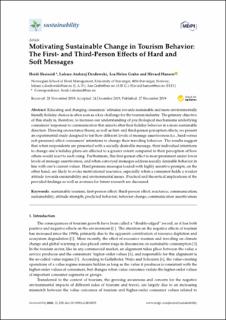| dc.contributor.author | Skeiseid, Heidi Victoria | |
| dc.contributor.author | Derdowski, Lukasz Andrzej | |
| dc.contributor.author | Grahn, Åsa Helen | |
| dc.contributor.author | Hansen, Håvard | |
| dc.date.accessioned | 2020-04-20T08:50:27Z | |
| dc.date.available | 2020-04-20T08:50:27Z | |
| dc.date.created | 2019-12-27T11:04:36Z | |
| dc.date.issued | 2019 | |
| dc.identifier.citation | Skeiseid, H., Derdowski, L.A.. Grahn, Å.H et al. (2019) Motivating Sustainable Change in Tourism Behavior: The First- and Third-Person Effects of Hard and Soft Messages. Sustainability, 12 (1). | en_US |
| dc.identifier.issn | 2071-1050 | |
| dc.identifier.uri | https://hdl.handle.net/11250/2651630 | |
| dc.description.abstract | Educating and changing consumers´ attitudes towards sustainable and more environmentally friendly holiday choices is often seen as a key challenge for the tourism industry. The primary objective of this study is, therefore, to increase our understanding of psychological mechanisms underlying consumers’ responses to communication that aims to alter their holiday behavior in a more sustainable direction. Drawing on reactance theory, as well as first- and third-person perception effects, we present an experimental study designed to test how different levels of message assertiveness (i.e., hard versus soft pressure) affect consumers’ intentions to change their traveling behavior. The results suggest that when respondents are presented with a socially desirable message, their individual intentions to change one’s holiday plans are affected to a greater extent compared to their perception of how others would react to such cuing. Furthermore, this first-person effect is most prominent under lower levels of message assertiveness, and when conveyed messages address socially desirable behavior in line with one’s current values. Hard pressure messages loaded with highly assertive prompts, on the other hand, are likely to evoke motivational reactance, especially when a consumer holds a weaker attitude towards sustainability and environmental issues. Practical and theoretical implications of the provided findings as well as avenues for future research are discussed. | en_US |
| dc.language.iso | eng | en_US |
| dc.publisher | MDPI | en_US |
| dc.rights | Navngivelse 4.0 Internasjonal | * |
| dc.rights.uri | http://creativecommons.org/licenses/by/4.0/deed.no | * |
| dc.subject | økonomi | en_US |
| dc.subject | turisme | en_US |
| dc.subject | reiseliv | en_US |
| dc.subject | sustainable tourism | en_US |
| dc.title | Motivating Sustainable Change in Tourism Behavior: The First- and Third-Person Effects of Hard and Soft Messages | en_US |
| dc.type | Peer reviewed | en_US |
| dc.type | Journal article | en_US |
| dc.description.version | publishedVersion | en_US |
| dc.rights.holder | © 2019 by the authors | en_US |
| dc.subject.nsi | VDP::Samfunnsvitenskap: 200::Økonomi: 210 | en_US |
| dc.source.pagenumber | 13 | en_US |
| dc.source.volume | 12 | en_US |
| dc.source.journal | Sustainability | en_US |
| dc.source.issue | 1 | en_US |
| dc.identifier.doi | 10.3390/su12010235 | |
| dc.identifier.cristin | 1763928 | |
| cristin.ispublished | true | |
| cristin.fulltext | original | |
| cristin.qualitycode | 1 | |

